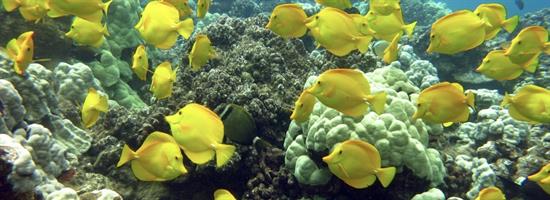(Washington, DC) -- U.S. Representative Ed Case (Hawai‘i-First District) today reintroduced his measure to protect the world’s increasingly fragile coral reef ecosystems by restricting international imports of protected ornamental reef fish and coral species collected through destructive practices.
“Our oceans, teeming with life and rich biodiversity, depend on the health of coral reefs, some of the most biologically diverse ecosystems on Earth,” said Case. “Nearly 25% of the ocean’s fish rely on coral reefs for shelter, food and breeding grounds. These reefs and the species that inhabit them are critical to the balance and vitality of our oceans.”
Case continued: “Unfortunately, coral reefs and the marine life living in them are under threat due to the high demand for ornamental reef species. This has resulted in unsustainable and harmful collection practices, such as overcollection of species, particularly younger specimens; reef-dredging; the use of harmful gill nets, explosives, or poisons; and excessive mortality of specimens during transit.
“These practices not only deplete species populations but also cause irreversible damage to the coral ecosystems themselves. In some cases, this damage has led to the extirpation of species from specific areas and the introduction of invasive species, which further disrupt the ecological balance. The long-term consequences of these practices are the loss of biodiversity and the degradation of habitats that are vital to the health of our oceans.”
“Marine life inhabiting coral reefs have been in high demand in recent years, creating a culture of unsustainable and damaging collection methods," said U.S. Representative Jared Huffman (CA-02), Ranking Member of the House Natural Resources Committee, and an original co-sponsor of the measure. "The irresponsible tactics being used are killing off these special creatures and ravaging ecosystems that are already getting decimated by climate change. It's more important now than ever that we hold fishing industries accountable and take extra precautions to protect our marine ecosystems – and this bill will help us do exactly that."
“As a science-based organization, we stand behind the science that calls for keeping the reef fish populations intact to generate healthy reef ecosystems,” said Jonnetta “Jonee” Peters, Executive Director, Conservation Council for Hawai‘i. “This practice also helps to combat the ever-increasing threats from climate change.”
Peters continued: “On a cultural level, over harvesting of our reef fish takes away a food source from the community, lessening the chance for the fish to re-populate, and therefore affecting other species ability to thrive.
“Home aquarium fanciers fish harvesting and collecting and other commercial entities take away thousands of reef fish for a select and privileged few, sacrificing the health of our reefs and minimizing the ability for the people of Hawai‘i to utilize the reef as a food source and maintain our responsibility to protect our native species.”
"Protecting coral reefs isn’t just an environmental issue; it’s a promise to future generations that they will experience the beauty, biodiversity, and benefits of a healthy ocean,” said Mark Haver, Sustainable Ocean Alliance North America Regional Representative and Policy Advisor.
“The Saving NEMO Act is an essential step toward fulfilling that promise."
“We have an opportunity to take decisive action,” said Case. “My Saving Natural Ecosystems and Marine Organisms (NEMO) Act would prohibit the importation into the United States of protected reef species taken through unsustainable or destructive practices.”
Case continued: “My bill will also fill a critical gap in existing laws by addressing those species that, while not endangered, are still collected through methods that harm marine ecosystems. It also includes a process for delisting a species if the Secretary of the Interior and the Secretary of Commerce determine that its collection no longer poses a substantial risk to its sustainability, providing an incentive for the industry to adopt responsible practices.”
Attachments:
· Text of measure here
· Case remarks on measure here
· Picture of yellow tang reef fish courtesy Paula Ayotte and NOAA Fisheries
###

